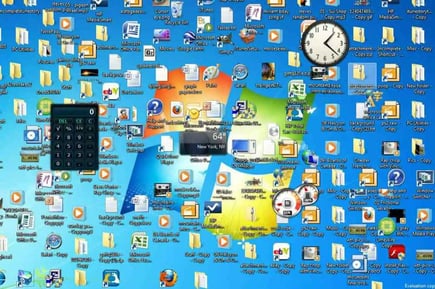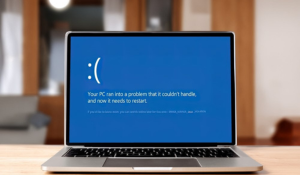The Great Digital Detox: Tips & Tricks to Clean Up Your Computer
The Great Digital Detox: Tips & Tricks to Clean Up Your Clogged Computer

Imagine walking into your home to find overflowing piles of clutter - dust bunnies multiplying under the couch, stacks of unopened mail threatening to topple, and that mysterious odor emanating from the back of the fridge. Unpleasant, right? Imagine a slow and unsafe computer with unnecessary files and hidden security risks. Just as neglecting your physical space invites chaos, ignoring your digital hygiene can have equally nasty consequences.
So, why is cleaning up your computer so important? Let's peel back the layers of this digital onion:
1. Performance Boost: A cluttered computer is a slow computer. Unnecessary files, rogue programs, and temporary data slow down your computer, causing it to lag and struggle when you click. Cleaning up has several benefits. It creates more space, improves memory usage, and allows your processor to work better. This can enhance your computer's performance.
2. Security Shield: A dirty computer is a hacker's playground. Old software, lost backups, and hidden malware create security vulnerabilities. Hackers can exploit these vulnerabilities to steal your data, invade your network, or gain control over your files. Regular cleaning strengthens your digital defenses, patching vulnerabilities, updating software, and removing potential threats, keeping your digital haven secure.
3. Mental Sanity: Physical or digital clutter breeds stress. Seeing a desktop drowning in icons, knowing your hard drive is bursting at the seams, and constantly facing glitches and slowdowns can be an anxiety-inducing recipe for tech-induced meltdowns. Cleaning up your computer transforms it into a well-organized oasis of calm, reducing frustration and boosting your digital zen.
4. Productivity Powerhouse: Imagine spending hours searching for documents buried in a digital landfill, wasting precious time that could be spent on actually getting things done. Cleaning your computer improves workflow by creating accessible folders, organizing files, and freeing up bandwidth for focused work. The result? More efficient workflows, increased productivity, and a satisfied sigh of accomplishment.
5. Future-Proofing Your Files: Time marches on, and so does technology. However, clinging to old software and obsolete file formats risks compatibility issues in the future. Regular cleaning helps you update and convert files. This ensures that your important data stays accessible and usable. It also helps to keep your data current as technology changes.
Now, let's dive into the nitty-gritty: practical tips and tricks to transform your digital dumpster fire into a sparkling haven of efficiency.
1. The File Annihilator:
- Uninstall the Ghost Army: Take inventory of your programs. Be ruthless! Uninstall anything you haven't used in ages, duplicate applications, or programs you downloaded in a fit of impulsive clicking. Free up space and silence those nagging "update available" notifications.
- Dust Bunnies of the Digital World: Temporary files, browser caches, and application leftovers accumulate like digital tumbleweeds. Use built-in tools like Disk Cleanup (Windows) or CleanMyMac (Mac) to banish these space-hogging ghosts.
- Download Detox: Be mindful of what you download. Avoid questionable websites and pirated software - these can be malware gateways. Stick to reputable sources and update your antivirus software regularly.
2. The Software Surgeon:
- Update, Update, Update! Vulnerabilities riddle outdated software. Prioritize updating your operating system and essential applications as soon as new versions become available. Patch those digital cracks before hackers exploit them.
- Startup Sluggishness: Does your computer take an eternity to boot up? Review your startup programs. Disable unnecessary applications that launch automatically at startup, streamlining your boot process and freeing up valuable resources.
- Resource Hog Hunters: Identify applications that guzzle RAM and CPU power. Task Manager (Windows) or Activity Monitor (Mac) can help you pinpoint the culprits. Quit resource-heavy programs when not in use or consider lighter alternatives.
3. The Backup Guardian:
- The Data Fortress: Prevent digital disasters with regular backups. Choose a backup method that suits your needs, whether it's cloud storage, an external hard drive, or a combination of both. Remember, the backup rule of two: store your data in two separate locations to avoid single points of failure.
- Version Control: Don't let accidental deletions or edits send you into a panic. Use file versioning in Word or Google Docs to track changes and go back to previous versions easily.
- The Digital Time Capsule: Don't let those cherished memories languish in digital purgatory. Back up photos, videos, and important documents onto external storage or cloud services. Secure your precious digital memories against hardware failures or accidental deletions.
4. The Security Sentinel:
- Firewall Fortification: Ensure your firewall is active and up-to-date.
- Password Purity: Strong, unique passwords are your digital locks. Use a password manager to generate and store secure passwords for all your accounts. Avoid the dictionary trap, say goodbye to "123456," and embrace the power of randomness!
- Suspicious Software Slayer: Be wary of free software downloads from unknown sources. Stick to reputable app stores and websites to avoid malware masquerading as helpful tools. If something seems too good to be true, it probably is.
- Phishing Fighter: Spam emails and deceptive websites can trick you into revealing sensitive information. Be vigilant! Don't click on suspicious links, hover over URLs to check legitimacy, and never share personal data through unsolicited emails.
5. The Organization Architect:
- Folder Frenzy: Create a logical folder structure for your files. Organize by project, type, date, or whatever works best for you. Label folders clearly and consistently to make finding things a breeze.
- Desktop Decontamination: Don't let your desktop become a digital landfill. Keep only frequently used files and essential shortcuts readily accessible. Organize the rest into labeled folders, giving your desktop a clean and calming aesthetic.
- File Naming Finesse: Ditch the cryptic filenames like "document1.docx" and adopt a descriptive naming convention. Use keywords, dates, and project names to identify files later easily. You'll thank yourself when you don't have to decipher "IMG_20231201_1432.jpg" in a year's time.
Real-Life Consequences of Digital Neglect:
Remember, neglecting your computer hygiene isn't just a minor inconvenience. It can have real-life consequences, as these cautionary tales demonstrate:
- A Student's Nightmare: Sarah, a university student, procrastinated on backing up her dissertation. A sudden hard drive crash wiped out months of work, leaving her scrambling to rewrite everything before the deadline. A regular backup could have saved her from heartbreak and sleepless nights.
- Business Breach: A small company failed to update their outdated accounting software. Hackers exploited a vulnerability, stealing sensitive financial data and costing the company thousands in damages. Keeping software up-to-date would have prevented this costly breach.
- Identity Theft Trauma: John unknowingly downloaded malware disguised as a popular game. The malware stole his online banking credentials, leading to unauthorized transactions and a long, stressful process of identity recovery. Being mindful of software downloads could have averted this nightmare.
Embrace the Digital Cleanse:
Think of cleaning your computer as a digital spring cleaning. It's a chance to shed the accumulated clutter, optimize performance, and strengthen your digital defenses. These tips and tricks can transform your sluggish, anxiety-inducing machine into a clean, efficient, secure digital journey partner.
Remember, a healthy digital life is a happy digital life. So, grab your mouse, roll up your sleeves, and embark on your Great Digital Detox today!
Bonus Tips:
- Use file encryption for sensitive documents.
- Utilize cloud storage for file sharing and collaboration.
- Schedule regular system scans for malware and viruses.
- Consider using a dedicated PC cleaning and optimization software.
- Take breaks from your computer! Give your eyes a rest and avoid digital burnout.
Remember, consistency is key. Make cleaning your computer a regular habit, just like cleaning your physical space. Stay organized and vigilant to keep your digital world productive, secure, and peaceful.
If your employees are having issues with their computers, share these tips to clean up the clutter. Contact us to learn about your computer options if it's time for new hardware.




